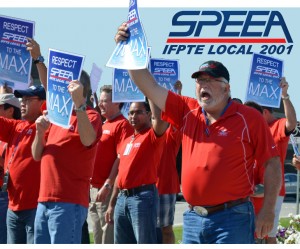LOCAL
SPEEA offers status-quo deal to focus on solving 787 issues
 The following was distributed today by SPEEA/IFPTE 2001:
The following was distributed today by SPEEA/IFPTE 2001:
SEATTLE (Jan. 16, 2013) – With the desire to focus all attention on solving the emergent issues with The Boeing Company’s 787, the union representing engineers and technical workers today proposed incorporating areas of agreement from ongoing negotiations into existing contracts and extending the agreements for another four years.
This “best and final” offer by the Society of Professional Engineering Employees in Aerospace (SPEEA), IFPTE Local 2001, was presented as negotiations resumed at 1 p.m. with the assistance of the Federal Mediation and Conciliation Service (FMCS) at the SeaTac Hilton.
SPEEA’s unprecedented offer would free Boeing and 23,000 engineers and technical workers from protracted and increasingly contentious negotiations that appear headed for a strike. It also allows the company and its technical workforce to focus on reaffirming confidence and proving the 787 is the reliable and safe product employees know it to be. Completing negotiations also helps Boeing stay focused on supporting customers, engineering the 767 tanker, 737 MAX, increasing 737 and 777 production rates and the other products needed for our national defense.
“These negotiations have been going on for more than a year,” said Tom McCarty, SPEEA president and Professional Team member. “At this point, we should move forward with the items upon which we can agree, and leave the status quo in place for the remaining items.”
Here is SPEEA Executive Director Ray Goforth’s explanation of the offer:
In addition to the proposed contract extension, SPEEA requested that Boeing continue to meet under the auspices of FMCS mediation to tackle the difficult issues that have proven so divisive in these negotiations.
“Our hope is that we can work collaboratively to find solutions in a data-rich environment outside of the constraints of the collective bargaining process” said Ryan Rule, Professional Team member.
In making the proposal, SPEEA agreed to accept Boeing’s funding mechanism for the Ed Wells Partnership training program. The status quo proposal continues to offset company medical costs through annual deductible increases based on salary growth. To put to rest the pension issue, a major point of contention, SPEEA proposes to accept the same pension proposal that Boeing negotiated with the International Association of Machinists (IAM District 751). Finally, the contract extension offer is made with the understanding Boeing recognizes same-sex survivor pension benefits pursuant to Washington state law.
“With our contracts put to rest, we can all roll up our sleeves and work the issues facing the 787 and Boeing,” said Sandy Hastings, Technical Team member. “SPEEA members know this is a great airplane, and we are eager to prove this to our customers, the flying public and the FAA (Federal Aviation Administration).”
SPEEA and Boeing started meeting in April to negotiate new contracts for 15,550 engineers and 7,400 technical workers. In October, engineers rejected Boeing’s initial offer by 95.5 percent. Technical workers rejected the company’s offer by 97 percent. Existing contracts expired Nov. 25. Since resuming talks Jan. 9 after a month-long FMCS-imposed recess, union members increased preparations for a possible strike. A 40-day strike in 2000 by SPEEA stopped deliveries and caused major factory and service bottlenecks at Boeing plants around the country.
A local of the International Federation of Professional and Technical Engineers (IFPTE), SPEEA represents 26,300 aerospace professionals at Boeing, Spirit AeroSystems in Wichita, Kansas, and Triumph Composite Systems, Inc. in Spokane. For more information, visit www.SPEEA.org.





